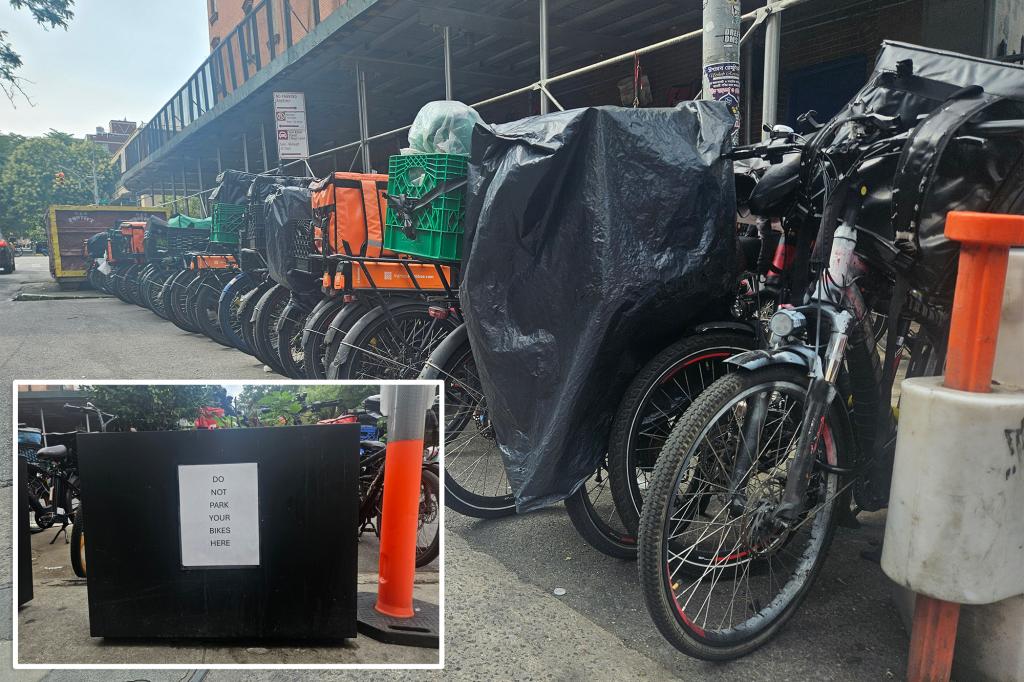Neighbors on an East Village street that’s been flooded with hundreds of e-bikes for migrant delivery workers are outraged, claiming the block has turned into a congested trash pit — and the city isn’t doing enough to help.
Conditions on the stretch of 11th Street, between First Avenue and Avenue A in Manhattan, have deteriorated over the last year as the number of two-wheelers parked there ballooned into the hundreds, locals said.
“You have 300 people that are moving back and forth through this sidewalk on any given day,” said Francisco Cornejo, who lives on the street.
“That equals food, that equals trash, and that equals rats.”
Cornejo said the situation has gotten so bad that he’s even considering fleeing, but added, “I don’t want to.”
“I love the neighborhood very much,” he told The Post Thursday.
“I don’t think that it’s fair for me to make a decision to pick up and move and move my family from a place that I like living in, right?
“Because there’s all this activity that is just not being sanctioned by the city.”
Other residents who previously spoke to The Post shrugged off the makeshift parking lot.
But Christine Renzi, the owner of a real estate management office located on the block, called it an “extreme nuisance,” comparing the situation to a growing encampment.
“They’ve just literally taken over the entire street,” said Renzi, whose company, Four Guds Realty Corp., rents out about 90 units in the area.
“It’s grossly affects by business because people don’t want to rent my apartments,” she said.
“No one wants to walk through that.”
The unsanctioned lot first sprung up over a year ago, but more and more migrant delivery workers began gravitating to the area over the last three months, parking e-bikes and scooters on the street and parts of the sidewalks, said Renzi, who also lives part-time on the block.
There were roughly 300 bikes stationed there Thursday morning, Cornejo said he counted.
About 70 bikes were tallied by The Post later that afternoon.
The vehicles have made it harder for residents to walk in the area, forcing them to squeeze past the two-wheelers, while cars parked on the block get boxes in between the contraptions, other locals said.
Trash is also riddled across the block because street sweepers can’t get through and vendors swing by to sell food to riders as they are coming and going, residents and workers said.
“Residents are walking by, squeezing past the bikes and the gate,” said Tonya Osborne, the office manager at the real estate management firm.
“You would think someone would say, ‘Well, let me move these bikes out the way.’”
Maintenance worker Sal Carfi added: “There’s more bikes than there are people that use them.”
The realty company put planters along part of the sidewalk in an attempt to keep some of the bikes away, Osborne said.
A delivery worker previously said he and others who store their bikes there do so because its a good area for business.
One of the workers stands guard overnight to make sure the bikes aren’t stolen.
Some locals said they’ve begged city officials, including Council Member Carlina Rivera and the local community board, to step in.
“I don’t think that my complaint is necessarily against who these people are specifically … because obviously they’re victims of their situation, their environment,” Cornejo said.
“I understand that they need to work.
“However, it is a complete failure and collapse on the city,” he added.
“The city needs to come up with some sort of regulation about how they need to park these bikes.”
Rivera, a Democrat, said in a statement her office is working with the Department of Transportation, Department of Sanitation and other agencies to accommodate both residents and delivery workers.
She said some fixes have lessened sidewalk congestion and that adding bike parking infrastructure in the neighborhood was in the works.
“We understand resident concerns about sidewalk congestion and sanitation issues caused by the large number of delivery workers gathering at E 11th Street and First Avenue,” Rivera said.
“This area has become a gathering space given nearby places of worship and food options that accommodate many worker’s diets,” the statement continued.
“Delivery workers travel the city every day to meet local demand for delivery, and many rely on this area as a place to rest and connect while earning a living.”
Read the full article here







